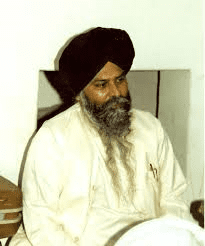Guru Ramdas Ji says:
Piyo daade ka khol deetha khazana,
Tan mere man pye nidhana,
To understand anything in the true manner, one has to read and understand Gurbaani. Gurbaani is like a box full of treasures which one needs to open in order to have desires fulfilled or questions answered. The key to Gurbaani is the words, and understanding their right meanings will open oceans of knowledge.
Gurmukh har gun gaye,
Hirdhe rusna rasye,
For both science and religion, the connection of two parts of the body is important. For science, it is the linking of our brain with our eyes (vision) and for religion it is linking our heart with our tongue. Even animals have eyes, but they are not scientists. All humans have eyes, but we will not all become scientists.
What do scientists do or how do they differ from the common man?
A scientist connects his eyes (visual world) to his brain more than a normal person does. Delving deeper into knowledge of matter, he finds the laws it’s obeying and then later uses those laws to transform or change any form of matter the way he wishes to. He may transform the material for money like an engineer does or for other comforts. Take a look at history, you won’t find many scientists who were blind from birth. If a person can’t see the matter, how will he make observations and draw conclusions?
What does a Saint do?
A saint connects his tongue (vocal) to his heart (emotions) more than a normal person does. He or she concentrates deeper on the words (naam) that he or she sings, being able to find the true meaning of life and achieving peace of the mind. A vibrant environment is created around him too, and the radiations that he spreads can eventually change the surroundings. In earlier days, we could find Saints in a Punjabi village, but now a Saint can be found in only one in 1000 villages. Now, take a look at Sikh history – you won’t find a single case for a dumb person being a Saint.
Often people ask what they should think about or what picture they should have in mind while mediating. The answer is that we don’t have to keep any picture in mind. One has to try and concentrate or listen to what he or she is singing. Gradually with time of practice one can go deeper.
Who are the greatest scientists of the world ?
For as long as a scientist could connect his eyes (visual) to his brain, the more and more he would go deeper and find greater laws of nature. If he looks up in sky, his thinking will take him beyond our planet, sun, solar system and galaxies. Or if he looks deeper into matter he finds the quantum particles, and numerous forces governing the universe.
The basic difference between a scientist and a Saint lies in transformation. A scientist could transform matter according to his comfort, but the Saint has to transform himself into the way God is. Even if a scientist discovers something, he remains unsatisfied, unfinished and troubled. On the other hand, a Saint may not have many worldly things in his hands, but he will always feel calm, relaxed, blessed and mentally free.
Scientist have stepping stones, an already established base on which they builds. If you don’t have the work of Galileo, Newton, Einstein or Stephen, then it’s difficult for science to be able to make new discoveries. A scientist uses the knowledge of previous scientists, and without that knowledge it’s not possible to go ahead on your own. A space scientist can neither ignore Newton’s laws nor Einsteins theories.
This is not the case with religious practice. Each Saint or practitioner has to make his own way, and no one else could simply copy that to his life.
Bhagat Ravi Das Ji says,
Jiyon jas manjhe machilo, marg pekhuna na jae,
Jiyo akashe pankhiyalo, khoj nirkho na jae,
Jo praani Gobind diyaave,
Padeyan Unpad parm gat paaave,
In religion, there is no compulsion to have previous knowledge. Saints like Kabir, Nand Lal and Ravidas didn’t have access to the Upanishads or Vedas (religious texts). All temple doors were closed to them and they were not even allowed to listen religious prayers without facing punishment – punishments like removing the ear drums turning the person permanent deaf. These are such unfair practices which prevailed in Ram Raaj too, historians and readers today get shocked when they read about these incidents.
All the doors were closed to them, so they opened the doors of their hearts and became great Saints.
In both fields, hard work is required. In order to find diamonds and gold one has to dig deeper into the earth. Similarly, In order to feel God, one has to meditate deep into naam. On the top of the human mind there is greed, lust, anger. There is no compulsion of singing or concentrating on one word (naam) of God, one can choose any name such as Waheguru, Allah, Ram, because God has no particular name.
Giving your all in science may result in tiredness and stress, because our brain has a limit to work. But in religious practice, one can feel as light as a flower or feel the true freedom of mind.
There can be a state that both a scientist and saint could come across.
Let us take an example of when Einstein was experimenting on his research. He tried 500 times and failed. His assistants, coordinating with him. said to him that they are diverting away from the results they were looking for. But Einstein said that they are coming close to results. Adding to this, he said at least he won’t do 700 mistakes again. Such was his level of dedication and didn’t lose his confidence but rather was further motivated to carry on his work.
When a scientist or religious person gets upset with not getting any fruitful results, the consequences can be that they remain stuck in the same problem or they may even give up. Many coordinators of Einstein left him.
In the case of religion, after long hard work or practice, he can turn into a non-believer or usually remain stuck his way. At this point, one has make a request (ardas) and has to agree:
I have tried as hard as I could to find you, but I couldn’t find you. I have walked as long as I could to locate you. Now, God, you help me, you find me.
This is because if you find God by your hard work, then your hard work is of greater importance than God. If your eyes and ears could sense the God presence then your senses would be more powerful than God.
A Saint would say, I have found God not because of my hard work but by his love or grace.
Ghalle na milyo, seu na milyo,
Milya achinchet,
A scientist won’t agree to this, believing his fruit to be a result of his hard work or intellect.
Today, we could always find scientists, engineers or doctors, but not Saints.
As the knowledge of science is being imparted to children in schools, we see more and more scientists, doctors and engineers than in previous centuries. Todays education system has neglected religious studies. Religious studies are given least importance. Rather, the study of science and religious has to go side by side.
This is because as the world is developing, it is losing its emotions and becoming less concerned with the welfare of family and others, Individuals are busy in collecting wealth. A Western person once said that Indians are very emotional, they start crying in weddings or when leaving for another place. The thing is, in the West emotions are fading away or love in families is diminishing, with divorce cases on the same day of marriages, husband and wife both busy earning more and more money, kids are raised by babysitters. No personal or family attachment is left.
In the science world, a scientist accepts if he couldn’t find what he was supposed to, because he has to prove or show it to fellow scientists. But in a religious world full of lies, people keep claiming themselves to be Saints. If a flower says that it is a flower, then consider it to be paper flower. A flower doesn’t have to tell that he’s a flower.
Original link to katha – http://www.gurmatveechar.com/audios/Katha/02_Present_Day_Katha/Giani_Sant_Singh_Maskeen/Giani.Sant.Singh.Maskeen—Gurmukh.Har.Gun.Gae.mp3






Thanks a million Harpreet Singh ji for translating Maskeen ji’s katha into English…This is a great piece of work and much needed to spread this true wisdom of Gurbani as narrated by Maskeen ji…